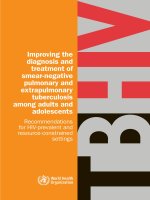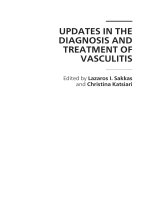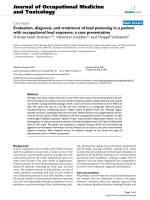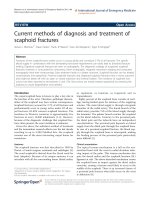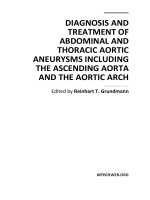Diagnosis and treatment of perforation of gastric duodenal ulcer at 103 Military Hospital in the period of 2013-2018
Bạn đang xem bản rút gọn của tài liệu. Xem và tải ngay bản đầy đủ của tài liệu tại đây (233.11 KB, 5 trang )
Journal of military pharmaco-medicine no4-2019
DIAGNOSIS AND TREATMENT OF PERFORATION OF
GASTRIC-DUODENAL ULCER AT 103 MILITARY HOSPITAL
IN THE PERIOD OF 2013 - 2018
Nguyen Van Tiep1; Dang Trung Kien2
SUMMARY
Objectives: To determine clinical characteristics and treatment results of perforation of
gastric -duodenal ulcer at 103 Military Hospital in the period of 2013 - 2018. Subjects and
methods: Recovery and clinical descriptions of 254 patients who underwent operation for
perforation of gastric-duodenal ulcer were collected. Results: Average age: 52.7 ± 16.8,
Male/female: 4.5/1. Symptoms at hospitalization: 100% of patients had a pain at hypogastric
area, 88.2% experienced acute onset of pain. 88.6% had “belly hard like wood”’ and 77.9% had
abdominal wall reaction. 47.6% of all patients had a history of stomach and duodenal ulcers.
Free air under the diaphragm was observed in 94.9% of cases on X-rays. Patients who were
close perforation holes got 93.7%. 5.1% underwent Newmann drain insertion and 1.2%
received emergency laparotomy. Average length of hospital stay after surgery: 5.1 ± 2.4 days.
Conclusion: Perforation of gastric-duodenal ulcer is a surgical emergency, and stitching the hole
of ulcer method (ulcer repair) is usually performed to treat it.
* Keywords: Gastric-duodenal ulcer; Perforation; Diagnosis; Treatment.
INTRODUCTION
Perforation of gastro-duodenal ulcer is
a common abdominal surgical emergency,
accounting for 3 - 5% of all abdominal
surgical emergencies and is the second
common cause of peritonitis after
appendicitis [2, 4, 5]. This disease is often
found in men aged 30 - 40 and in cold
climate especially with changeable weather.
90% of perforation of the superior part of
duodenum occurs. Perforation of gastroduodenal ulcer is easy to diagnose due to
typically occurs clinical and paraclinical
symptoms. With the development of
medicines for gastro-duodenal ulcer such
as PPIs, H2-histamine receptor inhibitors
and the development of laparoscopy, the
treatment for perforation of gastricduodenal ulcer has significantly improved.
To evaluate the result of treating
perforation of gastric-duodenal ulcer in
the period of 2013 - 2018, we conducted
this study at 103 Military Hospital.
SUBJECTS AND METHODS
Between 2013 January to 2018 May at
103 Military Hospital, 254 patients were
diagnosed with perforation of gastricduodenal ulcer based on clinical symptoms,
X-ray, abdominal CT and laparoscopy.
The data were analyzed with Excel.
1. 103 Military Hospital
2. Vietnam Military Medical University
Corresponding author: Nguyen Van Tiep ()
Date received: 08/02/2019
Date accepted: 09/04/2019
134
Journal of military pharmaco-medicine no4-2019
RESULTS AND DISCUSSION
1. Patients’ characteristics.
Average age: 52.7 ± 16.8 years. The
mean age was 40 - 60 (range 12 - 102),
explaining 48% of patients, patients aged
> 60 occupied 28.7%. In Ngo Minh
Nghia‟s study, mean age was 48.3 ± 13.5
and 44.14 ± 15.4 in Ho Huu Thien‟s [3, 4].
There were 208 male patients (81.9%)
and 46 female patients (18.1%). The
male/female ratio was 4.5:1. The disease
is more common in males than in females
due to unhealthy lifestyle such as alcohol
consumption and smoking habit, etc…
2. Clinical,
symptoms.
paraclinical
features/
* Time from onset of an abdominal
pain to hospital admission (n = 254):
≤ 6 hours: 156 patients (61.4%); 6 - 12
hours: 41 patients (16.1%); 12 - 24 hours:
32 patients (12.6%); > 24 hours: 25 patients
(9.8%).
In 61.4% of cases, time from the onset
of abdominal pain to hospital admission
was less than 6 hours. In 9.8% of cases, it
took more than 24 hours. This could be
explained by the fact that severe pain
requires an early hospital admission. This
rate in Ho Huu Thien‟s research was
77.5% less than 6 hours [4].
* Time from hospital admission to
operation (n = 254):
≤ 6 hours: 178 patients (70.0%); 6 - 12
hours: 62 patients (24.4%); > 12 hours:
14 patients (5.6%).
In 70% of cases, time from hospital
admission to operation was less than 6
hours. In 5.6% of cases, it took more than
24 hours. All patients who were operated
24 hours after admission had atypical
symptoms.
Table 1: Clinical symptoms at admission (n = 254).
Clinical symptoms at admission
Numbers of patients
%
Epigastric pain
30
11.8
Sudden, severe epigastric pain
224
88.2
Widespread abdominal pain
208
81.9
Abdominal rigidity
225
88.6
Abdominal muscle reaction
198
77.9
Blumberg sign (+)
208
81.9
Loss of liver shadow
112
44.1
Pulse > 100 beats/min
40
15.7
Patients with history of gastro-duodenal ulcer
121
47.6
Abdominal
pain
100% of patients had epigastric abdominal pain, which was valuable for diagnosis.
They are common clinical symptoms of perforation of gastric-duodenal ulcer. According
to Tran Binh Giang, the rate of gastric-duodenal ulcer perforation with sudden and
severe pain was 88.8%, with abdominal muscle reaction was 92% and our record
showed the same results as Druart M.I, Cougard P‟s findings [1, 7].
135
Journal of military pharmaco-medicine no4-2019
Table 2: Paraclinical symptoms.
Paraclinical symptoms
Numbers of patients
%
Abdominal X-ray (n = 254)
241
94.9
Abdominal X-ray with air-inflated stomach (n = 18)
16
88.9
Abdominal cavity ultrasound
(n = 254)
Abdominal fluid
198
77.9
Abdominal gas
83
32.6
Abdominal computer tomography
(n = 14)
Abdominal fluid
14
100
Abdominal gas
14
100
Paraclinical symptoms: free air under the diaphragm in the abdominal X-ray is an
important sign. This study showed that 94.4% of patients had this sign on the first time
taken the X-ray. This rate was the same as Tran Binh Giang‟s with 92%, and higher
than other authors‟ findings such as Lemaitre J (47.2%), Aali (86.6%) [1, 6, 8]. A
number of patients who didn‟t have this sign were appointed to take X-ray after addition
of gastric air, or abdominal CT (CT is usually for old and weak patients). 16/18 patients
had free air under the diaphragm in X-ray after addition of gastric air, 14/14 patients
had air in abdominal cavity in CT.
3. Treatment and result.
Table 3: Pathology appreciation during surgery (n = 254).
Pathology appreciated during surgery
Ulcer
Liquid in abdominal
cavity
Ulcer size
Location of
perforation
Numbers of patients
%
New
113
45.5
Chronic
141
55.5
Hepato-renal pouch of Morrison
254
100
Pouch of Douglas
250
98.4
Spleen cavity
134
52.8
< 1 cm
202
79.5
1 - 2 cm
42
16.5
> 2 cm
10
4.0
Superior part of duodenum
240
94.4
Antrum
8
3.1
Lesser curvature
4
1.5
Others
2
0.8
45.5% of patients had a new ulcer, 55.5% of patients had chronic ulcer. According to
Tran Binh Giang, this rate was 75% while chronic stomach ulcer‟s rate was 25% [1].
136
Journal of military pharmaco-medicine no4-2019
Table 4: Methods of treatment (n = 254).
Methods of treatment
Laparoscopic surgery
Open surgery
Total
200
38
238 (93.7%)
Newmann drain insertion
7
6
13 (5.1%)
Emergency gastrectomy
1
2
3 (1.2%)
208 (81.9%)
46 (18.1%)
254
Ulcer suturing
Total
The average surgery time: 71.1 ± 26.8 minutes (30 - 240).
Table 5: Relationship between ulcer and treatment (n = 254).
Ulcer
Feature
Size
Total
Treatment
New
Chronic
< 1 cm
1 - 2 cm
> 2 cm
Suturing
112
126
200
34
4
238 (93.7%)
Newmann drainage
0
13
2
6
5
13 (5.1%)
Emergency gastrectomy
1
2
0
2
1
3 (1.2%)
113
141
202
42
10
254
Total
Table 6: Relationship between age and treatment (n = 254).
Age
< 40 years
40 - 60 years
> 60 years
Total
Suturing
58
117
63
238 (93.7%)
Newmann drainage
1
3
9
13 (5.1%)
Emergency gastrectomy
0
2
1
3 (1.2%)
59
122
73
254
Treatment
Total
Patients with ulcer size < 1 cm made
up 79.5%; > 2 cm was present in 4%.
Patients with ulcer size < 1 cm were often
treated with suturing, and Newmann drain
insertion were performed for patients with
ulcer size > 1 cm. Condition of abdominal
cavity: 100% of cases had fluid in the
hepato-renal pouch of Morrison, 98.4% in
the pouch of Douglas, 52.8% in the
splenic cavity. Locations of ulcer are
commonly found at the superior part of
duodenum (94.4%), at antrum 68.8%
according to Do Son Ha and 90.8% in
Nguyen Cuong Thinh‟s [2, 5].
Methods of perforation treatment:
93.7% were treated with suturing and a
large number of them were sutured in
laparoscopy. Open surgery was usually
performed for old and weak patients.
Newmann drain insertion and emergency
gastrectomy were only performed on
a few patients (5.1% and 1.2%,
respectively). The average time of
operation was short, approximately
137
Journal of military pharmaco-medicine no4-2019
71.1 ± 26.8 mins (range 30 - 240 mins).
Suturing the perforation is the most
common method. This study showed that
patients with ulcer size < 1 cm or a new
ulcer were treated with suturing.
* Early result after operation (n = 254):
Patients were farted after operation in
about 3.6 ± 1.5 days, removed the
nasogastric tube after about 4.6 ± 1.5
days, and fed orally after about 5.6 ± 1.8
days, removed abdominal cavity drains
after about 5.3 ± 2.1 days, discharged
from hospital after about 5.1 ± 2.4 days.
CONCLUSION
Perforation of gastric-duodenal ulcer is
a common surgical emergency, and is
easy to diagnose due to typical symptoms.
This study showed that 100% of patients
had abdominal pain (88.2% with a sudden
and severe pain), 88.6% of patients had
abdominal rigidity, 77.9% with abdominal
muscle reaction and 47.6% with a history
of gastric-duodenal ulcer. Free air under
the diaphragm on an abdominal X-ray
was present in 94.9% of cases. Suturing
was the most common method, besides
Newmann drain insertion and emergency
gastrectomy. Length of stay in hospital is
short, about 5.1 ± 2.4 days.
2. Đỗ Sơn Hà, Nguyễn Quang Hùng. Nhận
xét đặc điểm lâm sàng và điều trị ngoại khoa
sau khâu lỗ thủng ổ loét dạ dày - tá tràng qua
236 ca trong 10 năm (1984 - 1993) tại Khoa
Phẫu thuật Bụng, Bệnh viện Quân y 103.
Ngoại khoa, 2, tr.18-21.
3. Ngô Minh Nghĩa. Đánh giá kết quả sớm
trong điều trị thủng ổ loét dạ dày - tá tràng
bằng phẫu thuật nội soi. Luận văn Bác sỹ
Chuyên khoa Cấp II. Trường Đại học Y Dược Huế. 2010.
4. Hồ Hữu Thiện. Nghiên cứu đặc điểm
lâm sàng, cận lâm sàng và kết quả điều trị
thủng ổ loét dạ dày - tá tràng bằng phẫu thuật
nội soi. Luận án Tiến sỹ Y học. Trường Đại
học Y - Dược Huế. 2008.
5. Nguyễn Cường Thịnh, Phạm Duy Hiển,
Nghiêm Quốc Cường, Nguyễn Xuân Kiên.
Nhận xét qua 163 trường hợp thủng ổ loét dạ
dày - tá tràng. Tập san Ngoại khoa. 1995, 9,
tr.40-45.
6. Al Aali A.Y, Bestoun H.A. Laparoscopic
repair of perforated duodenal ulcer. The
Middle East Journal of Emergency Medecine.
2002, 2 (1), pp.1-7.
7. Druart M.L, Vanhee R et al.
Laparoscopic repair of perforated duodenal
ulcer: A prospective multi center clinical trial.
Surg Endosc-Ultras. 1997, 11, pp.1017-1020.
REFERENCES
8. Lemaitre J, El Founas W. Surgical
management of acute perforation of peptic
ulcers. A single centre experience. Acta Chir
Belg. 2005, 105, pp.588-591.
1. Trần Bình Giang, Lê Việt Khánh,
Nguyễn Đức Tiến, Đỗ Tất Thành. Đánh giá
kết quả khâu thủng ổ loét dạ dày - tá tràng
qua soi ổ bụng tại Bệnh viện Việt Đức. Tạp
chí Y học Việt Nam. 2006, số đặc biệt, tháng
2, tr.143-147.
9. Seelig M.H, Seelig S.K, Behr C,
Schonleben K. Comparision between open
and
laparoscopic
technique
in
the
management of perforated gastroduodenal
ulcers. J Clin Gastroenterol. 2003, 37 (3),
pp.226-229.
138

